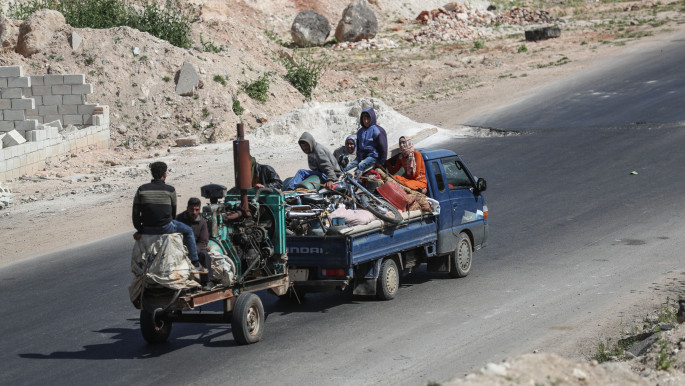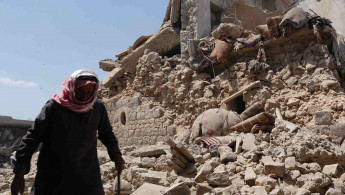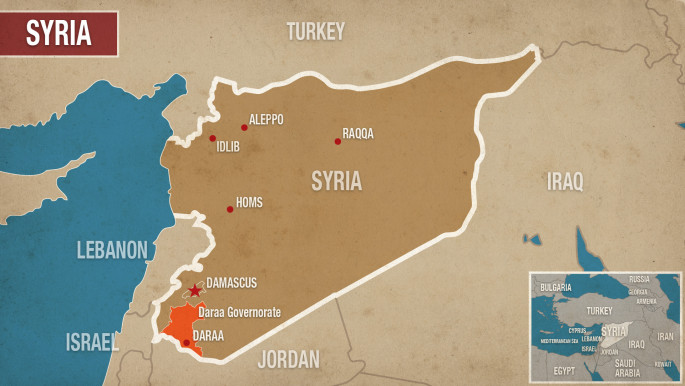Air strikes and shelling killed eight civilians in northwestern Syria Tuesday after deadly clashes between pro-government forces and jihadists rattled a months-old truce and sparked a new wave of displacement.
At least 53 fighters have been killed since Monday, in one of the deadliest flare-ups since a demilitarised zone around the Idlib region was agreed in September last year, the Britain-based Syrian Observatory for Human Rights said.
Several deadly skirmishes have occurred since the deal was reached in Russia but the last few weeks have seen an uptick in violence inside the planned buffer zone.
The region is under the control of Hayat Tahrir al-Sham - a former Al-Qaeda affiliate - in one of the last parts of Syria President Bashar al-Assad has yet to take back.
Around 2.7 million of its roughly three million residents need humanitarian assistance according to the United Nations but aid efforts are being thwarted by armed groups.
Assad's government had threatened an all-out assault on the area last year but that was averted by the deal for a de-militarised buffer zone between his ally Moscow and rebel backer Ankara.
A surge in attacks since April 20 has raised new fears a government offensive is imminent, prompting thousands of civilians to flee their homes towards quieter areas deeper inside Idlib province.
More than 140,000 civilians have been forced to flee attacks since February, Refugees International said on Monday.
'Urgent de-escalation'
Battles between jihadists and pro-government forces raged overnight around a hilltop in the northern countryside of Hama province, following an advance by Assad's forces.
Twenty-four pro-government fighters were killed in fierce fighting, the Observatory said.
Twenty-nine jihadists were also killed. They were members of Hayat Tahrir al-Sham (HTS), a group dominated by fighters from a former Al-Qaeda affiliate, and of the Turkistan Islamic Party, a Uighur-dominated jihadist group.
Fighting subsided early Tuesday after pro-government forces thwarted several counter attacks and consolidated new positions, Observatory chief Rami Abdul Rahman told AFP.
But, the air and artillery bombardment continued for an eighth straight day, killing eight civilians, the war monitor said.
At least nine civilians were killed in shelling and air strikes on Monday.
State news agency SANA said Syrian troops launched rocket attacks on armed groups in northwestern Hama province on Tuesday, killing several fighters, but it did not provide any toll.
UN chief Antonio Guterres has called "for an urgent de-escalation of the situation as the holy month of Ramadan begins" and urged "the parties to recommit fully to the ceasefire arrangements of the memorandum signed on 17 September 2018."
A UN statement said Guterres was alarmed by "reports of aerial attacks on population centres and civilian infrastructure".
At least seven health facilities have been hit since April 28, it said.
Nine schools have also been struck since April 30, and many more have closed their doors indefinitely, it added.
'Limited offensive'
It remains unclear whether the Syrian government and its Russian ally are planning to launch a full-scale assault, but Aaron Lund of the Century Foundation said "a limited offensive into Idlib, peeling off a few areas, should be easily within their capabilities."
He said the recapture of two key highways running through Idlib - the M4 and the M5 - could be among the "many goals" behind such an operation.
Under the September deal, hardliners were supposed to withdraw from the planned buffer zone, allowing traffic to once again flow along the two strategic highways, which connect government-held areas with the Turkish border.
Turkey has failed, however, to secure the jihadists' withdrawal, prompting government forces to take matters into their own hands, Syria specialist Fabrice Balanche said.
Taking the two highways would help Assad boost the recovery of Syria's nearby second city Aleppo, which remains cut off from most of its countryside and poorly connected to the rest of the country, he told AFP.
"Restoring traffic on these two axes will reduce transport costs to Aleppo," he said.
Retaking the two highways would also cut the rebel-held region in two, making it easier for government forces to recapture its southern part and isolate the jihadists in the north.
As for the humanitarian situation, humanitarian workers and aid groups in Idlib have expressed concern that interference in their work by HTS jihadist group and its civil wing -- the so-called "Salvation Government" - who control Idlib - has increased.
"Aid groups face interference from armed groups in Idlib, such as the restricting of access to vulnerable populations or attempting to influence beneficiary selection and the location of aid delivery," said Paul Donohoe of the International Rescue Committee.
The civil war in Syria has killed more than 370,000 people and displaced millions since it began with the bloody repression of anti-government protests in 2011.
 |
|
Residents flee with their belongings from regime shelling in Syria's countryside [AFP/Getty Images]
|
Follow us on Twitter: @The_NewArab







 Follow the Middle East's top stories in English at The New Arab on Google News
Follow the Middle East's top stories in English at The New Arab on Google News
![The UAE is widely suspected of arming the RSF militia [Getty]](/sites/default/files/styles/image_330x185/public/2024-11/GettyImages-472529908.jpg?h=69f2b9d0&itok=Yauw3YTG)
![Netanyahu furiously denounced the ICC [Getty]](/sites/default/files/styles/image_330x185/public/2024-11/GettyImages-2169352575.jpg?h=199d8c1f&itok=-vRiruf5)
![Both Hamas and the Palestinian Authority welcomed the ICC arrest warrants [Getty]](/sites/default/files/styles/image_330x185/public/2024-11/GettyImages-2178351173.jpg?h=199d8c1f&itok=TV858iVg)